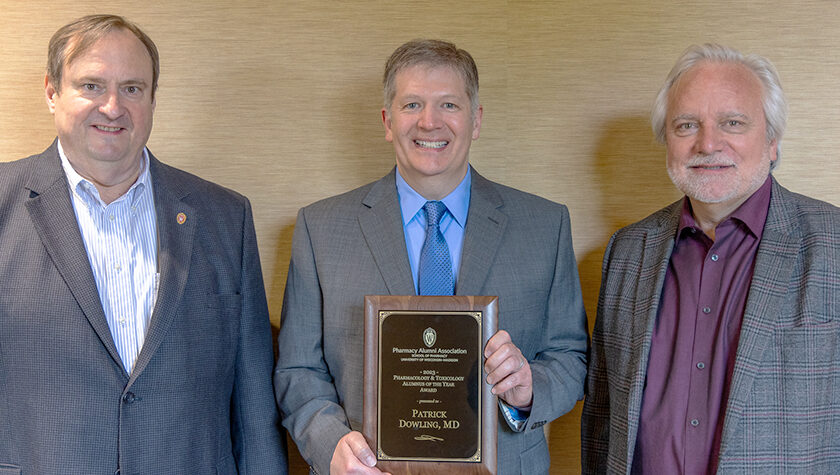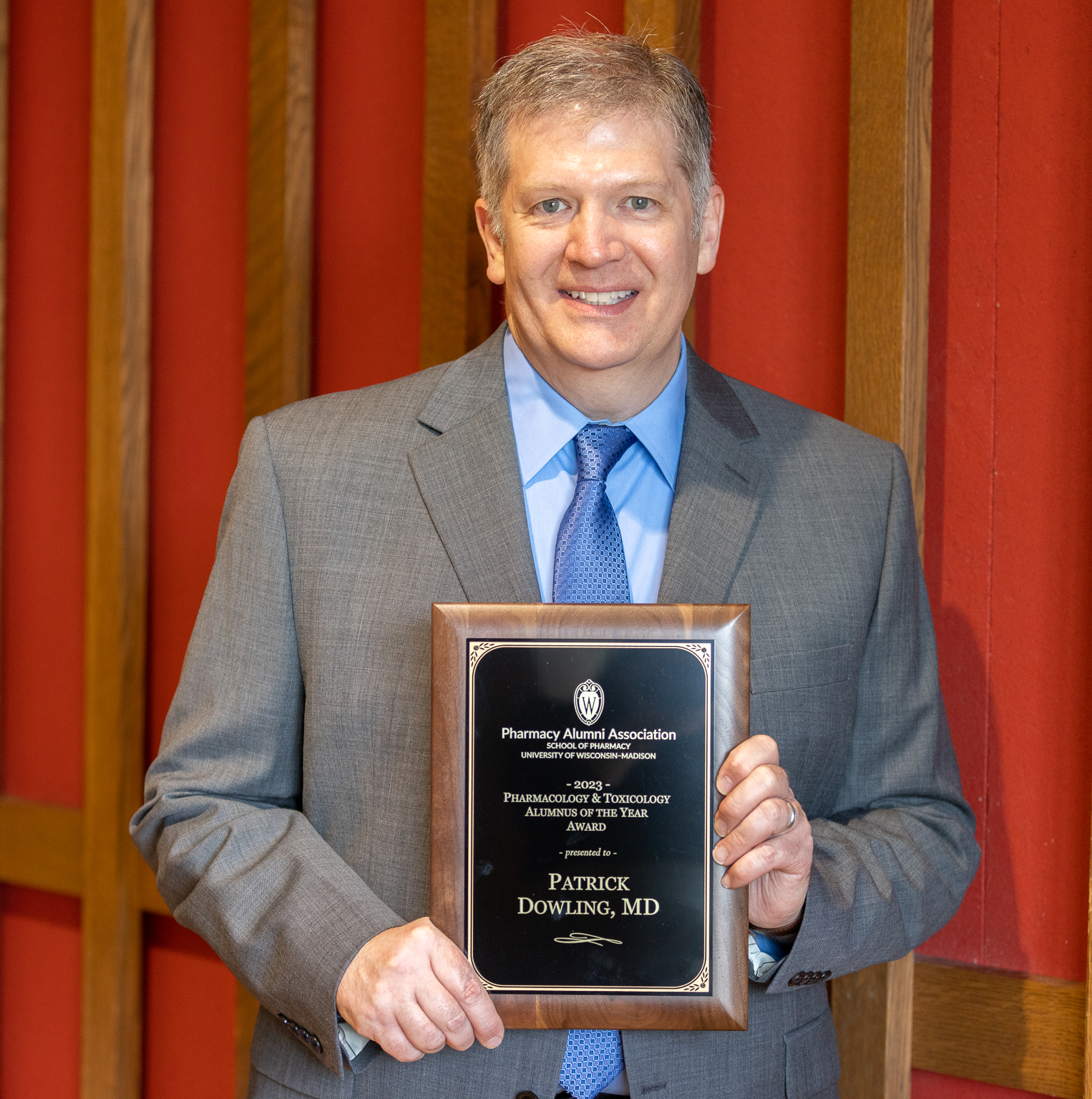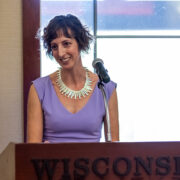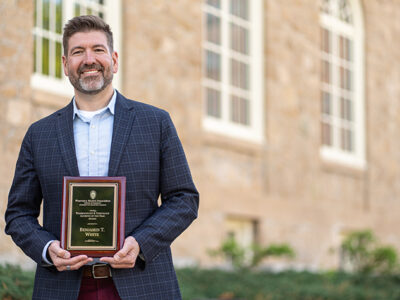
1
September

Dowling (BS ‘87) reflects on how Pharmacology and Toxicology opened doors to a fulfilling medical career
By Katie Ginder-Vogel
Growing up in Monona, Wis., one lake away from the University of Wisconsin–Madison, Patrick Dowling (BS ’87) always hoped to attend the flagship university. As a high school student, he was an active hospital volunteer, a member of the forensics and debate teams, and a band member.
“I was nerdy and really academic, and I thought I wanted to be an optometrist, but one of my teachers asked, ‘Why not go to medical school?’” he recalls. “That’s probably what sparked my determination to become a doctor my senior year of high school. I like to help people, so that was always at the forefront of my mind.”
Dowling’s determination paid off, using the UW–Madison School of Pharmacy’s Pharmacology and Toxicology undergraduate program as a launching pad to a career as a physician. Today, he’s a pulmonary and critical care physician at UW Health and the medical director of clinical documentation integrity at UnityPoint Health–Meriter. In honor of his impactful career, Dowling has been selected as the School of Pharmacy’s 2023 PharmTox Alumnus of the Year.
“It was unique to be in the first year of a program as an undergrad. We all took a leap of faith, and I’m incredibly grateful.”
—Pat Dowling
“Patrick is a very proud graduate of our program and promotes the preparation he received as key to his success in medicine,” says former Dean and Professor Emeritus Mel Weinswig, who nominated Dowling for the award. “He has an excellent reputation in pulmonary care and teaching of medical students and residents.”
“I feel so privileged and honored to be selected,” Dowling says.
PharmTox launching pad
When he was admitted to UW–Madison, Dowling entered the university planning on medical school, and fortuitously, the School of Pharmacy’s Pharmacology and Toxicology bachelor’s degree program was created his sophomore year.
“As a sophomore, they were advertising the program, and as soon as I knew about it, I knew I wanted to be in it,” Dowling recalls. “I applied and was accepted.”
Dowling was attracted to the way the PharmTox major integrated science and systems to allow students to solve challenging problems using an analytical approach. His interests in basic pharmacology and toxicology evolved in the major, as he sought to understand how things work differently in settings in which systems don’t function normally.
“The combination of scientific exploration and analysis sounded exciting and fit with my need to take premed coursework,” Dowling says. “The major was scientifically fascinating to me, and I found it rewarding and really enjoyed it.”
As the major’s first cohort moved through the courses, faculty and program mentors adjusted requirements based on student feedback. The program was constantly being fine-tuned to best meet students’ needs.
“The administration was very supportive of us. They solicited our feedback and listened to us,” he says. “It was unique to be in the first year of a program as an undergrad. We all took a leap of faith, and I’m incredibly grateful.”

Dowling — who is still involved with the School of Pharmacy as part of the Alumni Link program, which matches new graduates with established alumni to help build career connections — says the School’s stewardship of the PharmTox program and its students remains the same.
“That is an incredible testament to the School and its vision and administration — the respect they show to students and their well-being,” Dowling says. “That is truly part of the mission, and it shows.”
Undergraduate PharmTox students take many courses alongside graduate students. Dowling took a pathology course with nursing students and a graduate-level agronomy statistics class.
“It was one of the most intense classes I have ever taken,” says Dowling. “It earned me a letter of recommendation from the professor for medical school and was a great bonding experience for the PharmTox students.”
The tight-knit group became close friends and ambassadors for the PharmTox program.
“People were confused about who we were, so we were always thrust into the role of explaining the PharmTox program and providing information for people,” Dowling says. “It was an interesting role to be put into as a college student and a great learning experience for all of us.”
Dowling says the major prepared him academically for medical school, and also taught him adaptability, clinical reasoning, flexibility, and independence.
“We were a little cluster of kids in graduate-level classes, and we were going to sink or swim, and I think we all swam,” he says. “It made for a fantastic college experience, and there’s nothing like it in a school of this size.”
Becoming a pulmonologist
After graduation from UW–Madison, Dowling entered medical school at the Medical College of Wisconsin. His friend and classmate Peter Langengstroer (BS ’87), 2021 PharmTox Alum of the Year, attended at the same time, and they remain friends.
“I had a great foundation for medical school; my undergraduate degree prepared me well,” Dowling says. “PharmTox did me a world of good; there were many times where it opened doors and opportunities for me through my career.”

After Dowling’s second year of medical school, he worked for SC Johnson in Racine, Wis., as a consultant in his spare time — a job he landed after approaching a professor visiting to deliver a pharmacology lecture. Hired to help rewrite their employee health screening program, Dowling also got exposure to other projects.
“They were toxicology testing Glade apple spice carpet freshener — they’d put people in a room, take the bag off a vacuum cleaner, have them vacuum, aerosolize, and do pulmonary function tests to see if it had an effect,” says Dowling, adding wryly, “I don’t love that scent anymore.”
Through SC Johnson, Dowling also organized a complete health screening program for the Milwaukee Fire Department’s 1,100 firefighters, which sparked his interest in carbon monoxide poisoning. He credits the knowledge and skills he developed in his PharmTox major with helping him be successful.
“I got to work with 1,100 firefighters across three shifts and multiple sites and coordinated performing biometric screening, spirometry pulmonary function tests, carbon monoxide tests, and EKGs,” Dowling recalls. “To be given the ground framework and told, ‘Here’s what we need to do; we need you to organize this and take care of it,’ was a really incredible experience, and PharmTox opened that door for me.”
Dowling completed his medical residency at the Medical College of Wisconsin, serving as chief resident. That’s when he figured out he wanted to specialize in pulmonary and critical care, so he went on to complete a pulmonary and critical care fellowship at Indiana University, which included a toxicology rotation. Dowling’s chief resident year was also when the seed for his current involvement in informatics and clinical documentation was planted.
Multi-faceted work
As chief resident, Dowling was tasked with completing monthly forms for every hospital resident at Froedtert Hospital and the Milwaukee County Medical Complex. If residents rotated between the two hospitals, their appointment percentages were divided, adding to the complexity of the paperwork. Dowling, who had always been comfortable with computer technology, wrote an Excel macro to streamline the process of filling out the forms.
Hospital administrators took notice of his informatics aptitudes and invited Dowling to be one of eight physicians selected to choose the electronic medical records solution for the hospital.
“When we implemented Epic at both hospitals, that’s where my informatics journey began,” says Dowling. “They asked for volunteers to help make customization decisions in Epic, which is part of Epic’s implementation process. We were trying to be ambassadors for moving from a paper system to an electronic system. As we moved into implementation and go-live, I was offered my current role as informatics physician champion. Not long thereafter, the chief information officer, who knew me from my informatics work, asked me to be the medical director of clinical documentation integrity.”
“PharmTox did me a world of good; there were many times where it opened doors and opportunities for me through my career.”
—Pat Dowling
Nearly half of Dowling’s current workload is administrative, including informatics, clinical documentation improvement, and quality work at the hospital. His position includes an administrative role — physician scheduling — and the rest of his day-to-day role is clinical. Dowling has chaired Meriter Hospital’s clinical council for the past nine years, which focuses on quality control, and currently serves as chair of his community hospital’s Department of Internal Medicine.
“I’m proud of my clinical care, and I always say I’m an internist first and a pulmonary/critical care specialist next,” Dowling says. “I feel like I take good care of my patients, and I really enjoy what I do, including patient care, administrative work, and quality work — it’s been very rewarding. I love being a doctor.”





